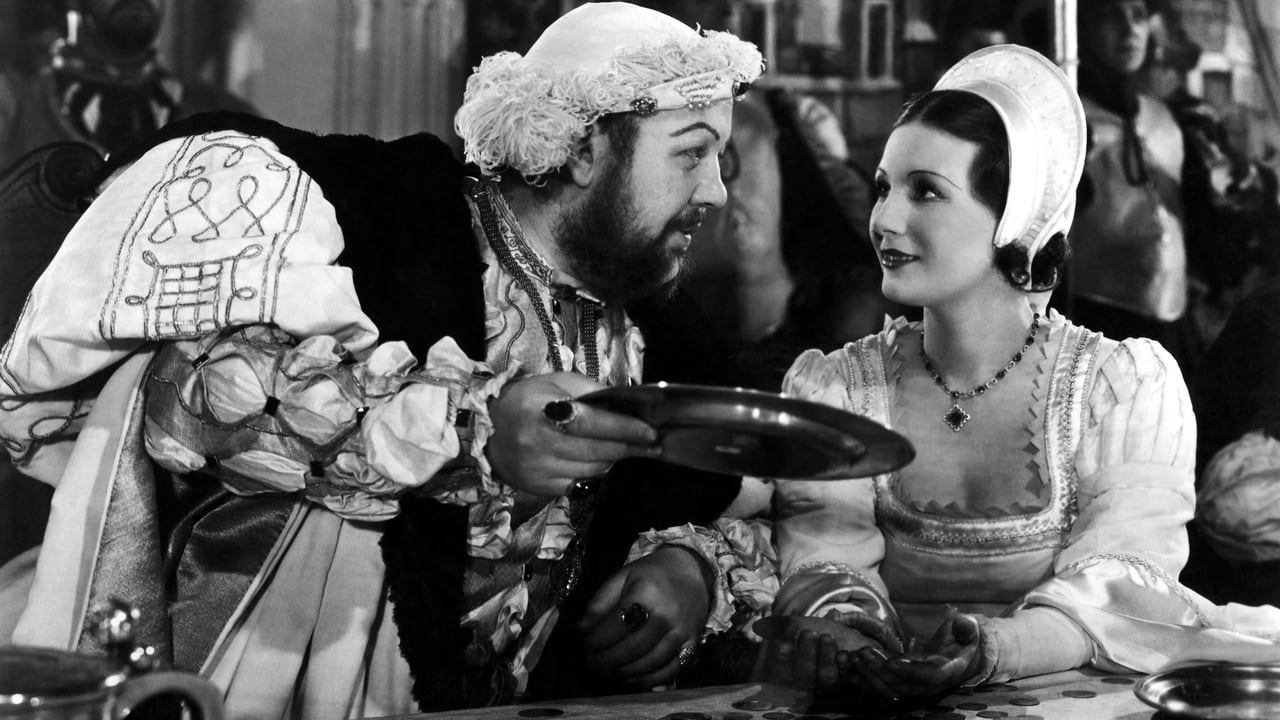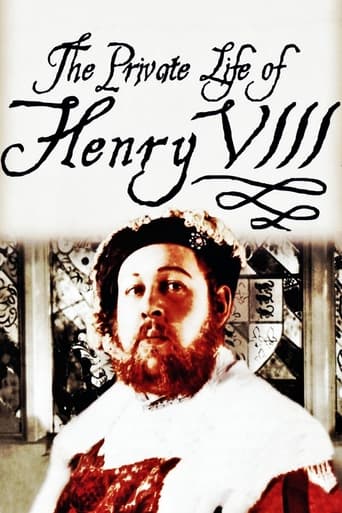

A Brilliant Conflict
... View MoreThis movie was so-so. It had it's moments, but wasn't the greatest.
... View MoreI gave this film a 9 out of 10, because it was exactly what I expected it to be.
... View MoreWhile it is a pity that the story wasn't told with more visual finesse, this is trivial compared to our real-world problems. It takes a good movie to put that into perspective.
... View MoreI cannot tell you how many people I have come across who do not get that this is a black comedy and not a factual representation of the life of Henry VIII, despite the dryness of the title. One person even said they shut the film off after the first inter title quips that Katharine of Aragon was not worth mentioning because she was a good woman. Do they not realize that was a joke or are people THAT dense? If you don't realize it's supposed to be humorous after witnessing the circus-like attitude toward Anne Boleyn's execution at the opening, then surely you did by the time it gets to the wedding night between Anne of Cleves and Henry, where they play cards as they nonchalantly discuss terms of divorce.Ranting aside, if you're one of those people who DOES realize that this is a comedy, then you're bound to have a good time. The Private Life of Henry VIII (1934) is an episodic picture going through the many marriages of one of England's most infamous monarchs. Charles Laughton is amazing in the lead, portraying a Henry that is commanding and powerful as well as humorous and poignant. He's especially moving during his final scenes, where Henry tries fighting against his advancing age to impress his much younger fifth wife and especially when he breaks down after discovering she has been carrying on with a much younger man. Other notable performers are Elsa Lanchester as Anne of Cleves who plays off of Laughton well, and the gorgeous Merle Oberon as Anne Boleyn who faces death with dignity and a bit of humor.Turn your inner historian off and enjoy!
... View MoreSo persuasive was Charles Laughton in his first major role that he defined for all time our image of the famous English monarch with the perennial marriage problems: regal in bearing, arrogant in manner, stuffing himself on roasted fowl and tossing the bones haughtily over each shoulder. The film was a huge success both at home and abroad (it was the first British production ever to win a sizable American audience), most likely because of Laughton's entertaining portrait of the king, ascribing to Henry the petulance and charm of a precocious child. The temperamental actor took the role in his teeth and ran away with it, winning international acclaim and a Best Actor Oscar. And yet for all its flamboyance his performance is also surprisingly sympathetic, revealing the aging king as a lonely man unable to find the simple happiness he desperately craved, and in the end wistfully accepting the nagging, maternal attentions of his sixth and final wife. The elegant settings and costumes were achieved on an amazingly small budget, but the static camera and sometimes primitive dialogue should be forgiven as typical artifacts of the early sound era.
... View MoreDEFINITION: Prejudice. Pronunciation: 'pre-\'pre-je-des\, Function: noun, Etymology: Middle English, from Anglo-French, from Latin praesicium, previous judgment. A preconceived judgment or opinion. (Culled from Merriam-Webster On Line) OKAY, so we were wrong. We had seen some stills from this film in some books with some explanations about the movie and its cast, director, producer and its renown. The guy in the Starring & Title Role who became important in Film History was some Brit Stage and Movie Actor named Charlie Laughton or something like that.MR. CHARLES LAUGHTON managed to become an Internationally recognized Film Star with his extremely intense and larger than life interpretation of the Monarch with the perpetual woodies. While remaining respectful, Mr. Laughton's characterization managed to touch all aspects of a most complex personality. We see a portrait of an undoubtedly great Historical figure who was also essentially one, big, overgrown spoiled child.THE FILM is broken up into 5 vignettes.. There being one segment for the years of each of the 6 contestants-excluding for Mrs. T. numero uno, Miss Catherine of Aragon. The titles at the beginning of the explains movie that Catherine was an essentially faultless Spanish Princess who saw, heard and did no evil during her wearing of the British Championship Belt of Women's Monarchs. (TRANSLATION: Her story was too dull and lacking any salacious, juicy dirt to gratuitously be displayed in a 20th Century, early talking movie.) SERIOUSLY THOUGH FOLKS, the production crew, including Director Alexander Korda. The screenplay by Lajos Biro contained some uniquely sardonic dialogue which was liberally peppered with plenty of offbeat, smart alecky and ironic type of humour.OUR FAVOURITE scene featured two Headsmen engaged in diligent and painstakingly tedious work of putting a properly super sharp edge on the blade which will be used to separate Henry's Wife #2, Anne Bolyn from her head. The two, an Englishman and a Frenchman, who was given the assignment, argue about proper technique, protocol and just why the Foreigner ever got the assignment in the first place. "You're puttin' our own executioners out of work", argues the Brit. Well whatta ya know, Schultz! It's Outsourcing, pure and simple, 16th Century Style!OTHER scenes included Henry demonstrating a prodigious appetite, while browbeating and otherwise toying with the members of his courtly attendants, courtesans and assorted chum-buddies. Henry tells a joke, which makes him laugh in an uncontrollable hysteria; which of course requires all at the huge dining tables to replicate, eventually spreading throughout the immense staff of servants. At that remote point, those several halls away pick upon the uncontrolled merriment; if no way else through the principal of "Sympathetic Vibration." (Look it up, Schultz!) IN one later scene the now 52 year old Henry is caught up in a Wrestling Match with a much younger Grappler, which he is bound and determined to finish. He manages to do so without resorting to cheating. (Can't you just hear a ring announcer's powerful voice booming out something like: " ..and the winnah, with a Tudor Block-Chop, and still Champeen of Britain and Ireland, King Henry VIII!" AS far as changes in personality and the appearance of Henry and those who remained for any period around the Court without the telltale loss of head, the characters are aged very effectively. Old Henry is shown as young, active and powerfully built, athletic type, He winds up as an elderly, nearly bed-ridden old fart. Essentially Henry's metamorphosis takes him on a virtual time trip before our very eyes and ears (remember this was 1933, Talking Pictures, GOOD! Silents, BAD!).ODDLY enough the process of the 'Good' King's aging process struck us in an instant moment of a sort of perverse inspiration. This is so unusual that we had to debate whether or not to share it with our loyal readership; fearing that they might take a dim view of our failure to provide proper respect in following the proper protocol and reverence that is due to Royalty.INASMUCH as it's that bloodthirsty, narcissistic, overgrown man-boy of a Divine Rights of the King son of a bitch like this sociopath, Henry, we'll acquiesce to our public and share. (Think we shouldn't mince our words and tell how we really feel?) OKAY, here goes! We think that Charles Laughton's Henry starts out looking like a young Man Mountain Dean and finishes up looking more like the really good 'Downtown' Department Store SATA CLAUS! AS a film with a Historical Figure, it is highly recommended; although there have been many liberties and fictionalized much of it, kind of like SANTA FE TRAIL or DONDI.NOTE: As a matter of fairness to the old pudger, he was a fine writer, musician, composer and athlete; being adept at fencing, jousting, wrestling and dancing. (Hey Schultz, 'member that song & record, "Dance with me, Henry"?) Ironically, prior to his falling out with the Papal Authority, the King had been awarded a special title by the Pope as "Protector of the Faith".
... View MoreThis 1933 Alexander Korda production actually holds up mighty well today. Given that it is an early talkie, and was made in a fledgling British film industry, I was expecting more than a little creakiness. But it is still a very lively, well-paced film- in large part due to Laughton's terrific performance as the much-married King Henry VIII.Politics take a back seat in this bawdy royal yarn, as we watch fat, charismatic, roaring and sometimes sensitive Henry work his way through six wives in quick succession. Actually, we never see the first, Catherine of Aragorn. The film begins with the beheading of Anne Boleyn, played by a young Merle Oberon. It's an eye-catching small role for the future Mrs Korda, and she makes the most of her limited screen time. Stage player Wendy Barrie is Jane Seymour, Henry's pretty, dumb and short-lived third wife, and the kooky, delightful Elsa Lanchester threatens to steal Laughton's thunder as Anne of Cleves. She's the only woman in the film who doesn't want to be Queen! And Billie Barnes is ambitious Catherine Howard, who carries on a fateful affair with a young, handsome Robert Donat....Fine production values, a fun, sharp script and good acting propel the drama. Korda keeps the film moving at a lively pace, even if the editing is a bit primitive. The film only starts to lose it's spirit after the death of Billie Barnes- the rest of it is a rollicking ride. Laughton won the Oscar for his portrayal, and his dominating performance is still very admirable today. Yes, Laughton was very theatrical, but he was also a darn good actor, one of the best.
... View More